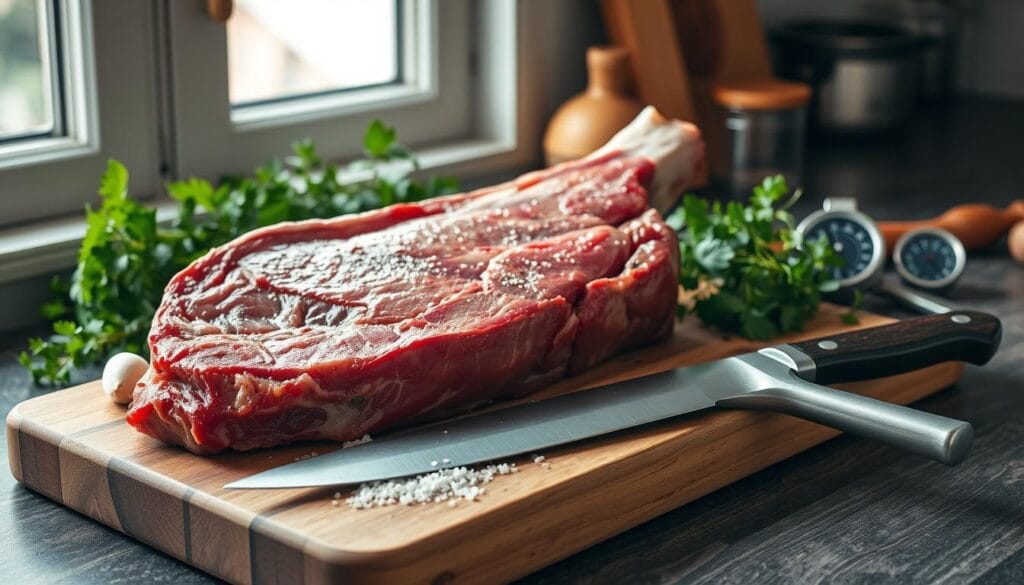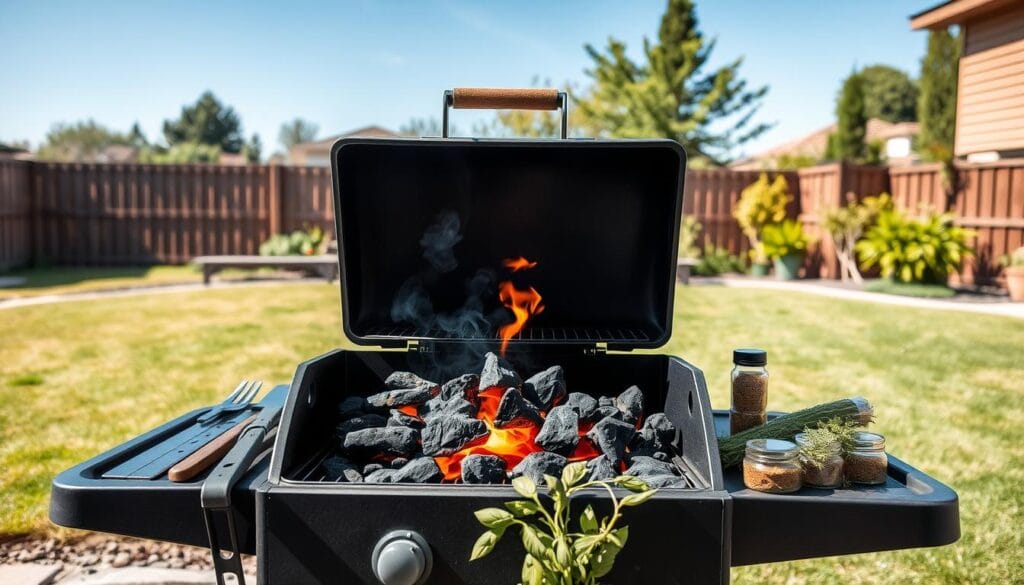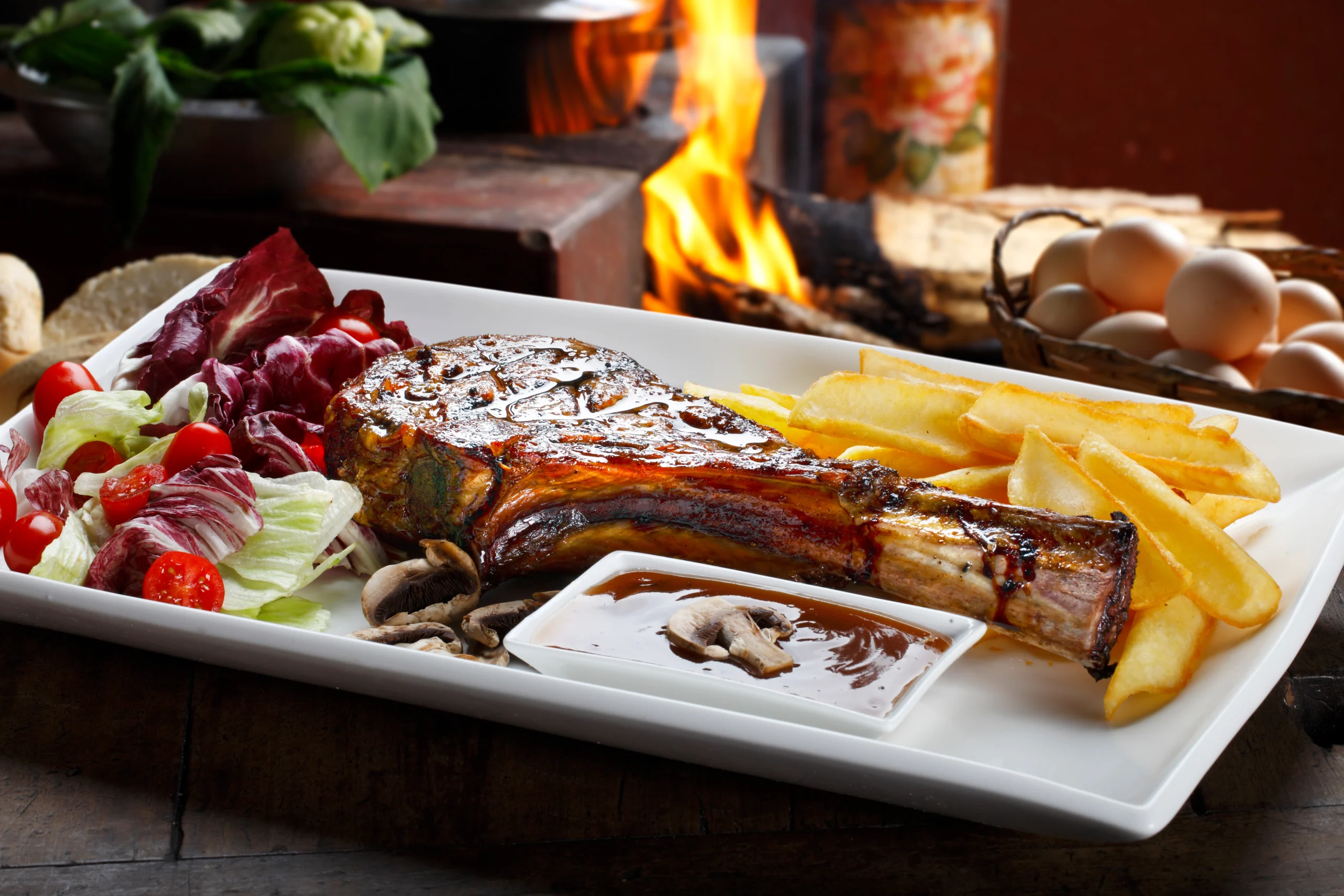How to Cook a Tomahawk Steak: Step-by-Step Guide
I’ve always been fascinated by the tomahawk steak. This cut, with its long “handle,” is a showstopper. It’s big and impressive, perfect for meat lovers. Today, I’ll show you how to cook a tomahawk steak that will wow everyone.
Table of Contents
Understanding the Tomahawk Steak Cut
The tomahawk steak, also known as the cowboy steak, is a bone-in premium cut of beef. It comes from the ribeye muscle. This cut has a long, frenched rib bone, making it look like a “tomahawk.”
The bone-in nature of the tomahawk steak makes it taste better and stay juicier while cooking.
What Makes it Different from Regular Ribeye
A tomahawk steak and a regular ribeye come from the same area, the rib primal. But, the tomahawk has a longer bone. This bone makes the steak look great and changes how it cooks and tastes.
Characteristics of Premium Cut
The tomahawk steak is a premium cut because of its size, rarity, and marbling. The fat in the meat makes it tender, juicy, and full of flavor. This makes the tomahawk a top choice for a special steak experience.
Bone-in Benefits
The bone in the tomahawk steak has many benefits. It makes the steak look better and helps cook it evenly. The bone also adds to the steak’s rich flavor, making it a favorite among steak lovers.
| Cut | Characteristics | Ideal Cooking Method |
|---|---|---|
| Tomahawk Steak | Bone-in ribeye with a long frenched bone, premium marbling, and impressive size | Grilling or broiling |
| Ribeye Steak | Boneless cut from the rib primal, well-marbled and tender | Grilling, pan-searing, or broiling |
| Filet Mignon | Lean and extremely tender cut from the tenderloin | Grilling, pan-searing, or roasting |
| Strip Steak | Flavorful cut from the short loin, with moderate marbling | Grilling, pan-searing, or broiling |
Essential Equipment and Tools
Cooking a delicious tomahawk steak needs the right tools. You’ll need a good grill or a heavy-duty cast-iron skillet for a perfect sear. A meat thermometer is key to check the steak’s internal temperature and aim for medium-rare.
You’ll also need tongs for handling the steak. Some aluminum foil is useful for wrapping the bone, if you choose to. And don’t forget a cutting board for resting and slicing the steak once it’s done.
| Equipment | Purpose |
|---|---|
| Grill or Cast-Iron Skillet | Searing the steak to achieve a crisp, flavorful crust |
| Meat Thermometer | Ensuring the steak is cooked to your desired doneness |
| Tongs | Safely handling the steak during cooking and plating |
| Aluminum Foil | Wrapping the bone to prevent overcooking (optional) |
| Cutting Board | Resting and slicing the steak after cooking |
With these tools, you’re ready to make a perfect tomahawk steak every time. Make sure to preheat your grill or skillet well for the best sear.
Ingredients and Seasonings Guide
Starting with the right ingredients and seasonings is key to a delicious tomahawk steak. Focus on a few essential elements to make your steak a culinary masterpiece.
Basic Seasoning Requirements
The classic trio of kosher salt, black pepper, and garlic powder is the foundation. These seasonings enhance the beefy taste of the meat, creating a perfect balance of flavors.
Specialty Herbs and Spices
Adding aromatic herbs like rosemary and thyme adds complexity. These herbs give your steak a subtle, herbaceous flavor that will excite your taste buds.
Compound Butter Components
A compound butter can elevate your tomahawk steak. Mix unsalted butter with chopped parsley and a bit of extra salt. This butter melts over the steak, adding a rich and indulgent touch to your meal.
| Ingredient | Quantity (for a 1-pound steak) |
|---|---|
| Kosher Salt | 1 teaspoon |
| Black Pepper | 1/2 teaspoon |
| Garlic Powder | 1/2 teaspoon |
| Rosemary | 1 sprig, chopped |
| Thyme | 2 sprigs, chopped |
| Unsalted Butter | 8 ounces |
| Parsley | 2 tablespoons, chopped |
Success with a tomahawk steak comes from balancing the meat’s natural flavors with the right seasonings. Try different combinations to find what you like best.
Preparing Your Tomahawk Steak
Before cooking your tomahawk steak, prepare the meat first. Let it sit at room temperature for about an hour. This helps it cook evenly and get a great sear.
After it’s at room temperature, dry it with paper towels. This removes any extra moisture from the surface.
Season the steak with salt, pepper, and garlic powder. This mix brings out the steak’s natural flavors. You can also wrap the bone in aluminum foil for a nice look, but it’s not necessary.
Tomahawk steaks are thick, about 2 inches. With the right prep, you’re ready to make a delicious and juicy steak.

“The key to a perfectly cooked tomahawk steak is in the preparation. Letting it come to room temperature and patting it dry will set you up for success.”
Temperature and Timing Guidelines
To get the perfect doneness for your Tomahawk steak, watch the internal temperature closely. Pull the steak off the heat at the right time. For a rare steak, aim for 125°F. For medium-rare, it’s 135°F, and for medium, 145°F.
Remember, the steak’s temperature will rise by 5-10 degrees while it rests. So, plan accordingly.
Internal Temperature Chart
| Doneness | Internal Temperature |
|---|---|
| Rare | 125°F |
| Medium-Rare | 135°F |
| Medium | 145°F |
Cooking Duration by Doneness
The cooking time for your Tomahawk steak depends on its thickness and your desired doneness. Sear the steak for about 3 minutes per side. Then, finish it in the oven at 425°F for 9-10 minutes for medium–rare. Adjust the oven time for your preferred doneness.
Remember, the secret to a perfectly cooked Tomahawk steak is to trust your meat thermometer. Pull the steak off the heat when it reaches the desired internal temperature. With practice, you’ll make mouthwatering, juicy Tomahawk steaks every time.
Grill Setup and Preparation
Getting your grill ready for a tomahawk steak is key. Start by heating your charcoal grill or gas grill to 400°F. This high heat will give your steak a great sear on the outside and keep it juicy inside.
For a charcoal grill, set up the coals in two zones. This lets you sear the steak over high heat and then cook it at a lower temperature. If you have a gas grill, preheat one side to high and leave the other off. This creates the same two-zone effect.
Before grilling, clean and oil the grates. This prevents the steak from sticking and helps get a nice sear. You can also grill indoors by searing on the stovetop and finishing in the oven.
| Grill Type | Preheat Temperature | Grate Preparation |
|---|---|---|
| Charcoal Grill | 400°F | Two-zone setup, clean and oil grates |
| Gas Grill | 400°F | One side high, one side off, clean and oil grates |
| Stovetop and Oven | N/A | N/A |
By carefully preheating your grill and preparing the grates, you’re set to grill a delicious tomahawk steak. It will impress your guests and satisfy your taste buds.

Direct vs Indirect Heat Method
Cooking a delicious tomahawk steak requires mastering two-zone cooking. This method uses both direct and indirect heat for the perfect sear and doneness.
Two-Zone Cooking Explanation
The direct heat zone is for quick searing. It’s great for browning the outside and keeping juices in. The indirect heat zone cooks the steak slowly to your liking, without burning.
On a grill, keep the lid closed and adjust flames to 375°F. This method controls temperature well. It prevents the steak from burning outside while cooking inside.
Temperature Control Tips
For a stovetop, sear the tomahawk steak on high heat for a caramelized crust. Then, move it to a 425°F oven to cook to your liking. This mix of searing and indirect heat gives you a tasty outside and a juicy inside.
“The key to a perfectly cooked tomahawk steak is mastering the balance between direct and indirect heat. This two-zone cooking method allows you to sear the exterior to perfection while gently finishing the interior to your desired doneness.”
Mastering the Searing Process
Getting a delicious crust on your tomahawk steak is key. This happens through the Maillard reaction, a chemical process that happens when proteins and sugars meet high heat. Searing your steak in a hot skillet or on the grill’s direct heat zone brings out amazing flavors.
To get a great crust, sear the steak for about 3 minutes on each side. This lets the Maillard reaction work its magic. Use tongs to handle the steak, and be ready for smoke and spatters as it cooks.
Also, sear the short side opposite the bone for about 1 minute. This makes sure the crust forms all around the meat. You’ll end up with a perfectly seared tomahawk steak full of flavor.
| Temperature | Time | Result |
|---|---|---|
| High Heat | 3 minutes per side | Maillard Reaction, Crust Formation |
| High Heat | 1 minute on short side | Evenly Seared Exterior |
Mastering searing brings out the best in your tomahawk steak. You’ll get a rich, caramelized crust that matches the juicy meat inside. With a bit of practice, you’ll be searing like a pro in no time.
Creating the Perfect Crust
After searing your tomahawk steak, it’s time to enhance the crust. Basting the steak with a flavorful butter mixture creates a rich, caramelized finish. This finish complements the meat’s natural flavor.
Butter Basting Technique
In a skillet, melt a few tablespoons of butter over medium heat. Add crushed garlic cloves and fresh thyme sprigs to the butter. Let the flavors infuse. Then, spoon this aromatic butter mixture over the steak, basting it all over.
This process adds a delicious butter-basted crust. It also makes the dish richer.
Herb Infusion Methods
- For a classic flavor, try garlic-thyme butter baste. The thyme and garlic create a mouthwatering crust.
- Try other herbs like rosemary, sage, or a mix of fresh herbs for different flavors.
- Add spices like smoked paprika or ground black pepper for depth and complexity.
To get the perfect crust, baste the steak often. This ensures the butter and herbs cover every inch. This technique makes your tomahawk steak look and taste amazing, like it’s from a restaurant.
| Ingredient | Quantity |
|---|---|
| Unsalted Butter | 4 tbsp |
| Garlic Cloves, Crushed | 3 cloves |
| Fresh Thyme Sprigs | 4 sprigs |
“The secret to a perfect crust lies in the butter basting. It’s a simple technique that takes your tomahawk steak to new flavor heights.”
Resting and Carving Techniques
After searing and cooking, let your tomahawk steak rest before carving. This step lets the juices spread evenly, making each bite juicy and flavorful.
Move the cooked steak to a cutting board and cover it loosely with foil. Let it rest for 10 minutes. This time is key for keeping the steak’s juices and ensuring it’s tender.
When carving, use a sharp knife and cut against the meat’s grain. Cutting against the grain makes the steak more tender and better to eat. If you wrapped the bone in foil, remove it before serving.
For a great look, cut clean, even slices and display them on a platter. The tomahawk steak’s size and bone design make it a table centerpiece. Serve it with your favorite sides and enjoy your hard work!
| Doneness | Internal Temperature |
|---|---|
| Rare | 120-125°F |
| Medium Rare | 130-135°F |
| Medium | 140-145°F |
| Medium Well | 150-155°F |
| Well Done | 160-165°F |
Proper resting and carving techniques are the keys to unlocking the full potential of a tomahawk steak.
Serving Suggestions and Pairings
When serving your Tomahawk steak, think about classic steakhouse sides. Mashed potatoes, creamed spinach, or a wedge salad are great choices. They highlight the steak’s rich flavors.
Pair your steak with a full-bodied red wine like Cabernet Sauvignon. Its bold tannins and fruity notes balance the steak’s richness. This creates a delightful taste experience.
For a stunning presentation, serve the steak whole. This lets guests admire the impressive bone-in cut. Or, slice the steak before serving for easier portions. Don’t forget to drizzle herb-infused butter over the slices for extra flavor and moisture.

